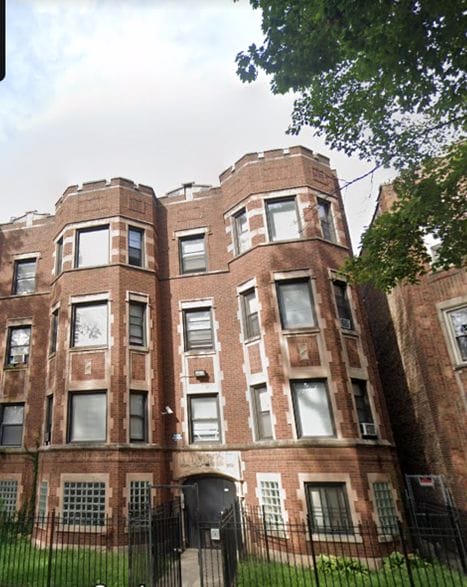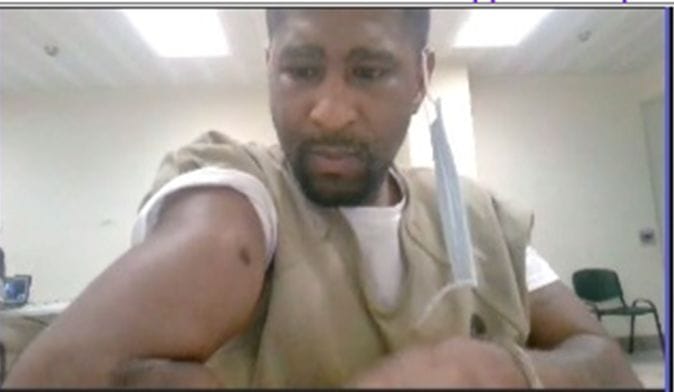Photo caption: DaShonn Maggette with his daughter
In the Cook County Jail, DaShonn Maggette, booking No. 20170606202, has been behind bars for six years waiting for his case to go to trial. But his trial has been delayed at least seven times, leading to years of frustration and disappointments.
Maggette’s day in court may finally come June 12, where a jury will decide whether he tried to kill a police officer during a scuffle in Chatham in 2017. If he’s convicted, Maggette could serve life in prison because of his past skirmishes with the law.
Presiding over the case is Associate Cook County Circuit Court Judge Lawrence Flood, a former cop, who while Maggette languished in jail for six years, kept a ballistic test results report sealed so that the Crusader, the media and the public cannot view them. It’s a case of two police officers who allege Maggette had a gun and fired a shot at one of them in an apartment building.
But when Maggette got word that the ballistic test results report ruled out Maggette used a gun during the scuffle, he tried to obtain a copy of the document from the Civilian Office of Police Accountability (COPA). He was denied. So was the Chicago Crusader after they filed a similar request.
As it turned out, Judge Flood had those records sealed from the public just two months after police alleged Maggette shot Michael Hudson in the hand in 2017. Six years later, the records remain closed and Maggette, his relatives and the Crusader don’t know why. The sealed documents raise questions of potential police bias concerns from a judge who once served as a Chicago police officer before he was admitted to the bar and began his law career.
The story begins on June 3, 2017. Maggette and several friends were hanging out outside an apartment building in the 8100 block of S. Maryland when a police cruiser drove by. Maggette, who was violating his curfew after completing parole for a drug conviction in 2016, ran into an apartment building.
Two Chicago police officers, Patrick Forbes and Michael Hudson, followed him up several flights of stairs. A scuffle occurs between Magette and Hudson on the building’s third-floor landing. Forbes fires three shots. Maggette is injured with three gunshot wounds in the elbow, shoulder and back before he’s taken to Cook County Stroger Hospital for treatment. Hudson was shot in the hand and was treated at Advocate Christ Medical Center in Oak Lawn while Forbes remained unharmed.
According to COPA, Maggette’s medical records from Stroger Hospital indicate that he suffered gunshot wounds to his right shoulder and right arm. Maggette was charged with attempted murder, aggravated battery with a weapon and aggravated battery with great bodily harm to an officer. Maggette believes he’s been prosecuted because of his past criminal record, which includes a conviction of attempted murder for shooting and wounding a 19-year-old man.
But this time around, Maggette is vehemently fighting for his innocence. As the ballistic test report remains sealed from the public, Maggette maintains he did not have a gun and did not shoot Hudson. Maggette said that he suffered three gunshot wounds, one more than the COPA report states. He said the bullet that hit him in the elbow also grazed his back. He believes the bullet that hit Hudson was fired by Forbes, not him. Maggette believes the ballistic test results will help prove his innocence and show that he was framed by two cops determined to get him locked up for life.
Maggette told the Crusader that in 2022, his public defender, Karin Talwar, showed him a ballistics test report that ruled out the use of the gun that he allegedly had to shoot Hudson. The Crusader left messages with Talwar, who did not respond by press time Wednesday, May 31, for the print edition.
Maggette said when he learned that the gun that he was accused of having was ruled out in the shooting, he said, “I asked her, so if a gun was ruled out, why am I being charged for attempted murder?”
Seeking more answers, Maggette said he filed a FOIA request for the ballistic report. In a letter dated May 18, 2022, COPA denied Maggette’s request, saying, “the records you have requested are barred from disclosure under an Order from Judge Lawrence [Flood] issued on August 1, 2017.”
The Crusader obtained a copy of the court order that sealed Maggette’s ballistic test report. It reads, “IT IS HEREBY ORDERED, That the City of Chicago and its entities shall not release any materials related to the above-captioned case under the Transparency Policy or Freedom of Information Act during the pendency of the criminal matter.
The Crusader was denied on May 12 for the same reason when it filed its own request for the ballistic report through COPA. Illinois Attorney General Kwame Raoul’s Public Access Bureau, which reviews denied FOIA requests said in a letter on May 25 that it agreed with the agency’s decision. In the letter, Bureau Chief Steve Silverman said, “The Attorney General has issued a binding opinion that concluded a public body does not violate FOIA when it withholds records pursuant to a court order.”
Silverman also said in the letter that because Maggette’s criminal case is pending, “COPA did not improperly deny your FOIA request. Therefore, the Public Access Bureau will take no further action in this matter.”
Silverman cited the U.S. Supreme Court decision GTE Sylvania, Inc. v. Consumers Union to support his bureau’s decision in agreeing to back COPA’s denial of the Crusader’s FOIA request for the ballistic test results report.
Several attorneys the Crusader spoke with say the sealed ballistic test report may have the potential of becoming a Brady violation, which occurs when a prosecutor or court fail to provide a defendant or defense attorneys with any evidence that is favorable or helpful to a defendant’s case.
According to the National Institute of Standards and Technology, “forensic ballistics involve the examination of evidence from firearms that may have been used in a crime. When a bullet is fired from a gun, the gun leaves microscopic marks on the bullet and cartridge case. These marks are like ballistic fingerprints. If investigators recover bullets from a crime scene, forensic examiners can test-fire a suspect’s gun, then compare the marks on the crime scene bullet to marks on the test-fired bullet.
The examiner will then assess how similar the two sets of marks are and determine if the bullets are likely to have been fired from the same gun or different guns. Cartridge cases are compared in the same way.”
And according to the COPA report, an Illinois State Police lab says when the DNA sample was taken from the weapon Maggette allegedly had and compared to the DNA sample taken from his DNA profile, Maggette’s DNA “could not be definitively detected in the sample from the weapon, nor could it be excluded.”
Maggette is among dozens of inmates under Judge Flood who have waited many years in the Cook County Jail without a trial. A recent Chicago Tribune investigation, “Stalled Justice,” reported that out of 14 judges, Flood had the 12 slowest case efficiency rates for handling violent crimes going back to 2015. Of the 22 murder cases Judge Flood presided over, the average case took 4.1 years to complete. Only two judges, Stanley Sacks and Kenneth Wadas, were slower, the Tribune reported.
There are also questions about Judge Flood’s professional background before his law career began. According to the online police archives database called the Citizens Police Data Project, from 1970 to 1984, Flood served as a Chicago police detective. Unsure about that source because it did not list Flood’s middle name Edward, the Crusader asked for his background information from the Office of Cook County Circuit Court Chief Judge Timothy Evans.
The Crusader explained that the information is for a story on a case that involves a police shooting. When Mary Wisniewski, Evans’ director of communications, did not respond to the request, the Crusader searched the widely used Sullivan’s Judicial Profiles directory of all active judges in Illinois.
That directory provides Judge’s Flood background as an attorney and Associate Cook County Circuit Court judge who was appointed in 2001. However, the directory says Flood was admitted to the Illinois Bar in 1984, the last year the Citizens Police Data Project says he was a Chicago detective. He then worked as an associate with the Chicago law firm of Burke, Burns & Pinelli, Ltd., before he served on the bench.
Sullivan’s Judicial Profiles also says Flood was born in 1949, the same year listed on the profile in the Citizens Police Data Project database. A separate database also said Judge Flood lives in Elmhurst, Illinois, the west suburban town that last February hosted a fundraiser event for Florida Governor Ron DeSantis.
COMING NEXT WEEK: Chicago Officers Patrick Forbes and Michael Hudson, who gave different accounts of the shooting, both have recent civilian complaints on their police records.








